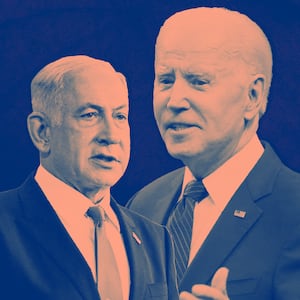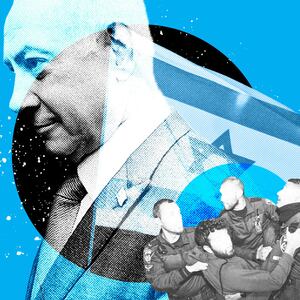Get more news and opinions in the twice-daily Beast Digest newsletter. Don’t miss the next big story, sign up here.
Last November, the far-right neo-Kahanist Itamar Ben-Gvir helped deliver Benjamin Netanyahu’s election victory. Once a fringe fixture of Israel’s radical right, he is now the country’s minister of public security. Unlike the late Meir Kahane, his hero, Ben-Gvir walks the corridors of power. Like Kahane, however, he finds himself at the eye of a continuous political storm.
On Monday, Benjamin Netanyahu, Israel’s prime minister, placed a temporary hold on his bid to degrade the country’s judiciary. To garner Ben-Gvir’s support, Netanyahu made a jarring concession that left critics seething and Ben-Gvir grinning—he would hand control of the National Guard (presently a unit of the Border Patrol) over to the ministry of national security, which is currently run by Ben-Gvir (the Border Patrol would then be subsumed into the reconstituted National Guard).
That’s a ton of clout for any one person, particularly Ben-Gvir, who decades earlier was declared by Israel’s military as unfit to serve.
In the end, Netanyahu may fail to honor his pledge. Funds might not be allocated. The government might fall. For the moment, however, the prospect of Ben-Gvir at the helm of a state-backed militia sets plenty of nerves on edge.
“It could be very dangerous,” a senior police official told Ha’aretz.
Earlier this week as throngs protested outside the Knesset, the unnamed official pondered whether “the minister would have sent companies from the National Guard to deal with the protesters, it looks bad.” (For the record, Kobi Shabtai, the police commissioner, opposes Ben-Gvir’s bid.)
Ben-Gvir said the Guard would be focused on “extortion in areas with criminal organizations and ‘mixed’ cities,” which The Jerusalem Post said is “a clear implication of focusing on Israeli-Arab crime,” adding, “National guard members would be issued guns and be considered combat police.”
Combat police under the control of a racist security minister, patrolling Arab neighborhoods. What could go wrong?
The specifics of his proposal have yet to be laid out, let alone finalized. But the events of the past few days have stoked fear that a National Guard in Ben-Gvir’s hands would serve as a cross between a personal praetorian and a band of bully-boys.
Remember when Donald Trump told the neofascist Proud Boys to “stand back and stand by”? Well, they ended up being the primary instigators of violence at the Jan. 6 insurrection at the U.S. Capitol.
For all of his talk of law and order, Ben-Gvir also has fans among “La Familia,” a right-wing booster club of Jerusalem’s Beitar soccer team. The group also brings its share of menace and law breaking.
“Ben-Gvir’s militias from La Familia are going wild right now on the streets of Jerusalem. Looking for Arabs to beat up,” Merav Michaeli, the leader of the opposition Labor Party tweeted. Part of the group then beat an Arab cab driver. “There are eggs, there are knives, there are weapons. We are on our way to Jerusalem,” one hooligan bragged on video.
“This is the man that Netanyahu promised to set up for him his own militia with regular salaries at the expense of the state,” she added.
Can’t get enough from The Daily Beast? Subscribe to the twice-daily Beast Digest newsletter here.
In a letter addressed to Yoav Gallant, the supposedly fired defense minister, Merav Cohen, a member of the opposition Yesh Atid party, urged that he classify La Familia as a terror group. (For the moment, Gallant still appears on the job.)
As Israel approaches its 75th anniversary, it’s worth recalling when David Ben-Gurion, the country’s first prime minister, made clear that the state would alone possess the monopoly on armed violence.
At the outset, the nascent government worked with Menachem Begin—leader of the Irgun Underground, a right-wing paramilitary group that committed numerous deadly bombings in Israel’s infancy—to integrate his troops into the newly formed Israel Defense Forces. In June 1948, Begin inked a formal agreement, but things did not proceed smoothly.
Armed confrontation between the Irgun and the Palmach (an elite force attached to the Haganah, the official pre-state underground) followed in what would become known as the Altalena Affair, an attempt by the Irgun to smuggle weapons. A sunk ship, standoff, deaths, and arrests followed. In September 1948, Begin disbanded the Irgun.
For decades, he then led the parliamentary opposition. Rule of law and democracy mattered. (Begin became prime minister in 1978).
But it wasn’t just the right-wing engaging in violence.
In November 1948, Ben-Gurion ordered the Palmach to be dismantled. Its alumni, “Palmachniks,” included Yitzhak Rabin, a future Labor prime minister, and Yigal Allon, a foreign minister and an interim prime minister.
Current relations between the U.S. grind loudly. On Tuesday, President Joe Biden announced that Netanyahu would not be at the White House anytime soon. The president also stressed that Israel’s favored status is directly tied to its commitment to democracy.
An alarmed Netanyahu pushed back at 1am local time, saying in a series of tweets: “I have known President Biden for over 40 years, and I appreciate his longstanding commitment to Israel. The alliance between Israel and the United States is unbreakable and always overcomes the occasional disagreements between us…Israel is a sovereign country which makes its decisions by the will of its people and not based on pressures from abroad, including from the best of friends.”
Ben-Gvir, for his part, was thoroughly unimpressed. “Israel is an independent country and no longer a star on the U.S. flag,” he remarked.
Sign up for the Beast Digest, a twice-daily run down on each day’s top stories. Don’t miss out, sign up here.









